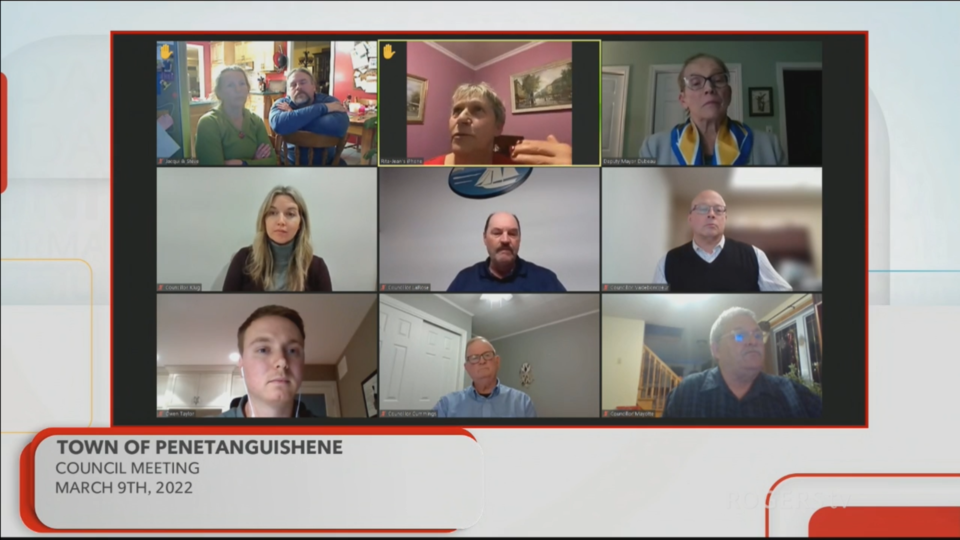Good short-term-rental operators in Penetanguishene shouldn’t have anything to worry about, but bad ones might want to get their act together before June.
A public meeting about licensing bylaws for short-term-rental (STR) units was held during a recent regular meeting of Penetanguishene council.
Penetanguishene is in the process of regulating STR accommodations through the drafting of licensing bylaws (LBL) and zoning bylaws (ZBL), expected to be implemented by late spring of 2022. A ZBL would regulate where STRs may be permitted in town, while an LBL would regulate uses including guest quantity, parking, noise, stay duration and inspections.
Town planner Owen Taylor provided information regarding the LBL proposals as a continuation of the process for which two open houses had been held a week prior.
“The town does not currently regulate short-term rentals,” stated Taylor, “and we don’t have a definition in our zoning bylaw. The only provision that we have to deal with short-term rentals is through bylaw complaints for our existing bylaws, such as the noise bylaw, clean yards bylaw among others.”
According to staff, a search for STRs in Penetanguishene identified 78 short-term rentals across platforms AirBnb and VRBO. In 2021, town bylaw received 26 calls with three properties being reoccurring offenders.
Penetanguishene resident Wendy Dobrijevic addressed council regarding capacity limits.
“We have a property on Champlain Road and we have three AirBnbs within 400 metres of our property,” said Dobrijevic. “Last year, the property next to us had over 30 people up there during a time where there was a restriction of only having 25 people inside.”
Taylor responded, “In the current draft of our new ZBL, the occupancy is limited to eight people with four bedrooms; any new AirBnbs or STR would need to comply with that.”
The majority of questions raised interchanged AirBnbs with STRs, which prompted Coun. George Vadeboncoeur to raise a point about the clear distinction; the property owner of a bed and breakfast who is living on the premises while renting out rooms.
The proposed ZBL defined an STR as a dwelling rented for not more than 28 consecutive days, while not a bed and breakfast, hotel or other similar use.
AirBnb owners Jacqui and Steve Hesler offered council a tour of their complex, and offered their model for running the service to planning staff.
“We’ve found in our experience that we’ve learned how to vet people who come to our AirBnb,” stated Steve. “We can say that we’ve had two unfortunate experiences with a younger group, and that’s what we watch out for now; we look to see what the numbers are before we approve somebody.
“We think that eight (occupants) is probably a little high. But we even carefully look at when six people apply to come to our AirBnb because – just like a hotel, a hotel will not rent a room to eight people; they probably won’t rent one to six people.”
Coun. Brian Cummings inquired if a demerit system would prevent or cancel STRs; Taylor replied it was an option that staff was exploring.
“We’ve already had some existing problems and we don’t have any teeth to enforce it right now,” stated Cummings. "I think a demerit system would be a good system to work with as far as trying to regulate some of this, and control it without having bylaw and police always attending these various places in the town.”
Later in the committee of the whole meeting, Vadeboncoeur expressed concern in regards to grandfathering in of STRs, and whether they were actually legal or had been presumed as such over time.
“Somewhere along the way, through looking at our zoning bylaw and looking at AirBnBs as an organization, we’ve come to the conclusion that they are a permitted use,” Vadeboncoeur explained. “Therefore, if we go with a new zoning bylaw, that these existing 78 become legal non-conforming – or grandfathered.
“And I’m troubled by that, because I’m not convinced in reading our zoning bylaw, the way our zoning bylaw is structured, that it’s an exclusionary bylaw. It says that these are the only things that are permitted; everything else is not permitted."
Vadeboncoeur asked staff to get an opinion through planning experts and a development solicitor: Are short-term rentals a permitted use in the residential zoning categories currently outlined in the zoning bylaw?
Staff was directed to take comments for consideration, and return to the April council meeting with drafts for the licensing and zoning bylaws.
Further information on the STR process, including meeting agendas and documents can be found on the Connect Penetanguishene website. The short term rental public meeting presentation can be located on the agenda page of the Town of Penetanguishene website.
Archives of council meetings are located on the Town of Penetanguishene YouTube channel.



